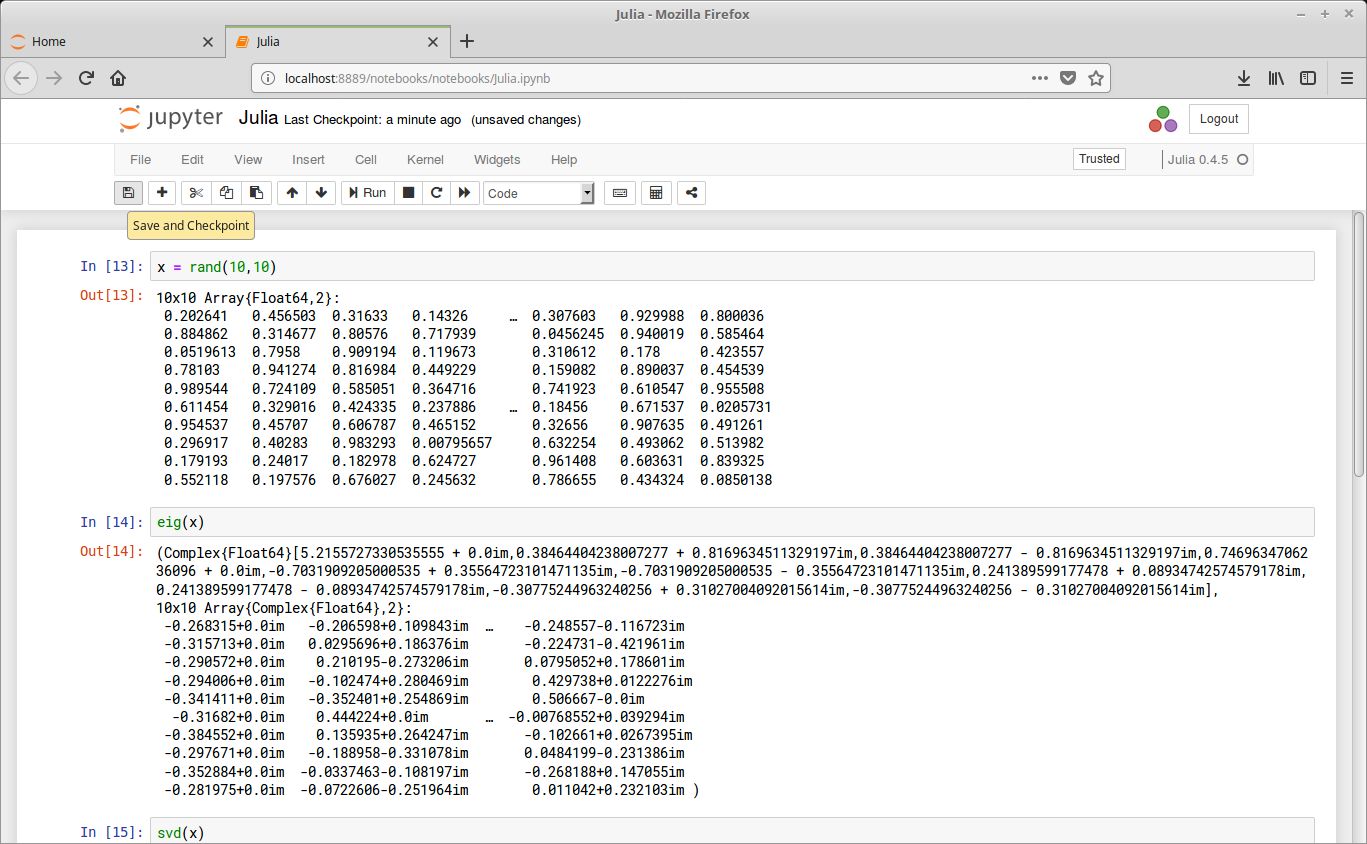The Jupyter Notebook is an open-source server-client web application that allows you to create and share documents containing live code, equations, visualizations and explanatory text.
Jupyter notebooks are a series of “cells” containing executable code, or markdown, the popular HTML markup language for prose descriptions. They have LaTeX support for mathematical equations with MathJax.
The notebook’s two main components are its kernels and a dashboard. A kernel runs and introspects the user’s code. The Jupyter Notebook App has a kernel for Python code, but there are also kernels available for many other programming languages.
Jupyter Notebook installs the IPython kernel. This allows working on notebooks using the Python programming language.
Uses include data cleaning and transformation, numerical simulation, statistical modeling, machine learning and a lot more.
Features include:
- Highly customizable.
- Support for over 40 programming languages, including those popular in Data Science such as Python, R, Julia, and Scala.
- In-browser editing for code, using the Markdown markup language, with automatic syntax highlighting, indentation, and tab completion/introspection.
- Execute code from the browser, with the results of computations attached to the code which generated them.
- Display the result of computation using rich media representations, such as HTML, LaTeX, PNG, SVG, etc. For example, render publication-quality figures inline with the matplotlib library.
- Author narrative text using the Markdown markup language.
- The ability to easily include mathematical notation within markdown cells using LaTeX, and rendered natively by MathJax.
- Notebooks can be committed to version control repositories such as git and the code sharing site GitHub.
- Export notebooks to HTML, reStructuredText, LaTeX, PDF, and slide shows.
Jupyter runs code in many programming languages, Python is a requirement (Python 3.3 or greater, or Python 2.7). Installing Acaconda is the recommended installation method.
Website: jupyter.org
Support: Documentation, Blog
Developer: Many
License: Modified BSD license

Return to Data Science Notebooks
| Popular series | |
|---|---|
| The largest compilation of the best free and open source software in the universe. Each article is supplied with a legendary ratings chart helping you to make informed decisions. | |
| Hundreds of in-depth reviews offering our unbiased and expert opinion on software. We offer helpful and impartial information. | |
| The Big List of Active Linux Distros is a large compilation of actively developed Linux distributions. | |
| Replace proprietary software with open source alternatives: Google, Microsoft, Apple, Adobe, IBM, Autodesk, Oracle, Atlassian, Corel, Cisco, Intuit, SAS, Progress, Salesforce, and Citrix | |
| Awesome Free Linux Games Tools showcases a series of tools that making gaming on Linux a more pleasurable experience. This is a new series. | |
| Machine Learning explores practical applications of machine learning and deep learning from a Linux perspective. We've written reviews of more than 40 self-hosted apps. All are free and open source. | |
| New to Linux? Read our Linux for Starters series. We start right at the basics and teach you everything you need to know to get started with Linux. | |
| Alternatives to popular CLI tools showcases essential tools that are modern replacements for core Linux utilities. | |
| Essential Linux system tools focuses on small, indispensable utilities, useful for system administrators as well as regular users. | |
| Linux utilities to maximise your productivity. Small, indispensable tools, useful for anyone running a Linux machine. | |
| Surveys popular streaming services from a Linux perspective: Amazon Music Unlimited, Myuzi, Spotify, Deezer, Tidal. | |
| Saving Money with Linux looks at how you can reduce your energy bills running Linux. | |
| Home computers became commonplace in the 1980s. Emulate home computers including the Commodore 64, Amiga, Atari ST, ZX81, Amstrad CPC, and ZX Spectrum. | |
| Now and Then examines how promising open source software fared over the years. It can be a bumpy ride. | |
| Linux at Home looks at a range of home activities where Linux can play its part, making the most of our time at home, keeping active and engaged. | |
| Linux Candy reveals the lighter side of Linux. Have some fun and escape from the daily drudgery. | |
| Getting Started with Docker helps you master Docker, a set of platform as a service products that delivers software in packages called containers. | |
| Best Free Android Apps. We showcase free Android apps that are definitely worth downloading. There's a strict eligibility criteria for inclusion in this series. | |
| These best free books accelerate your learning of every programming language. Learn a new language today! | |
| These free tutorials offer the perfect tonic to our free programming books series. | |
| Linux Around The World showcases usergroups that are relevant to Linux enthusiasts. Great ways to meet up with fellow enthusiasts. | |
| Stars and Stripes is an occasional series looking at the impact of Linux in the USA. | |
